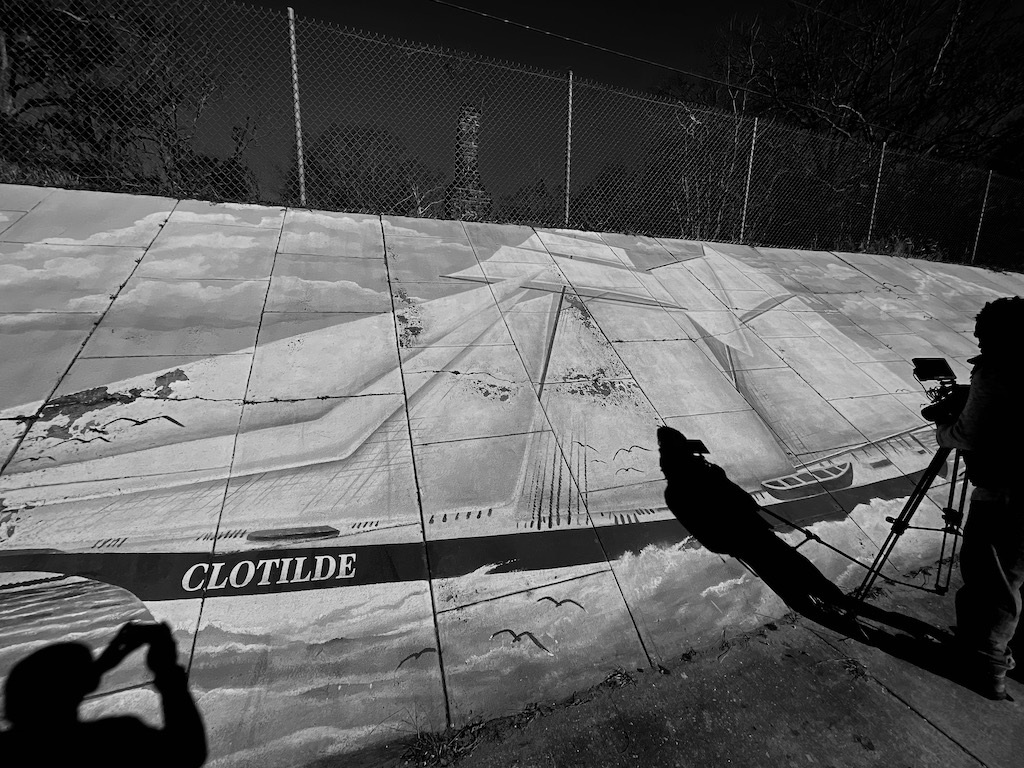
12 May Kindred Spirts-Joycelyn and the chief
In 2019 while traveling to New Orleans for a memorial to celebrate the life of a beloved family member, I stopped in Africatown, Alabama to pay homage to the descendants of the Clotilda. The story of the Clotilda is widely known as being the “last slave ship” to enter the United states 52 years after the international slave trade had ended. It is habitual for me to visit the African American parts of town while traveling. There is something spiritual by doing such. I cannot define it. It does however, feel like an innate force drives me to the places that once thrived before urban renewal, integration or gentrification. Perhaps it is because of my lived experience and/or oral histories collected over the years highlighting these places as “Park Avenue-ish.”
The words gentrification and urban renewal in my opinion are utilized by those who do not understand the negative impact on the community, or those who don’t mind playing monopoly with people’s lives who live in said places. I personally call the inhumane act, “hostile takeovers” due to the mental anguish and trauma many face while losing what they call home. These spaces are often occupied by descendants of ancestors who lived in the same communities for decades.
While visiting the Old Plateau Cemetery, I couldn’t help but notice multiple types of large trucks used for an asphalt company, driving pass the burial grounds loud and unapologetically. Enough dust lingered in the air that one could disappear in it soon after sundown. I certainly believe those resting in peace would pour sugar in their gas tanks, if the good Lord provided the opportunity to do so. From face value it looked like the Africatown had been kept intact, warding off hungry investors encroaching on our beautiful south via gentrification.
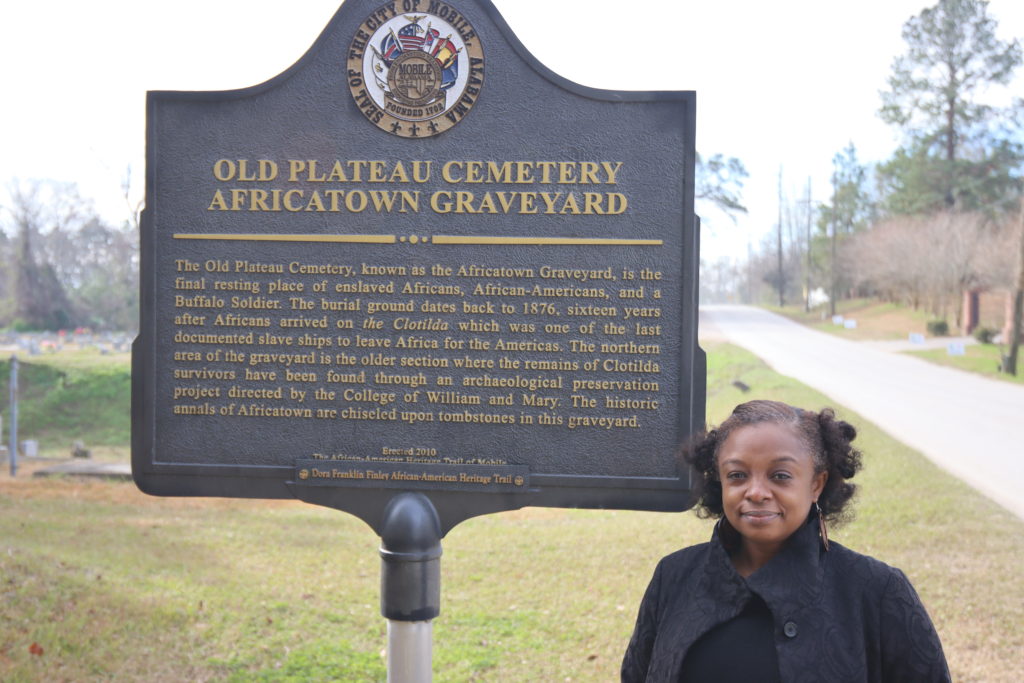
As I walked across the street to take a picture by the Africatown Blvd. street sign, I noticed smoke clouds in the sky which was a clear indication of an environmental threat which historically have endangered marginalized and oppressed communities for centuries. The cliché phrase “same script different cast” instantly came to mind. Because I needed to be in New Orleans by a certain time, I quickly visited other sites in Africatown relevant to its rich history before I left for the “Big Easy”. Upon arriving back home in Charlotte, North Carolina a few days later, I posted on my social media site History Before Us, my picture standing on Africatown Blvd. A few hours later, I received a message from a woman named Joycelyn Davis asking, “what are you doing in my hood.”
I laughed knowing culturally what this meant. Somebody southern and nosey, inquiring what business do you have their way. After brief bantering, I gave homage to the community, which then led to her disclosing she is a descendant of Chief Olualay/Oluale aka Charles Lewis who was illegally transported from African via the Clotilda. The release of Zora Neale Hurston’s book Barracoon: The Story of the Last “Black Cargo”, was released a year prior, which highlighted the life of Cudjoe Lewis. Her work was the introduction for a lot of folks about the Clotilda story. As an independent researcher, I was aware of it prior, but unfamiliar about any other individuals on-board the ship other than Cudjoe Lewis. Naturally as a lover of history, documentarian and collector of oral history, I inquired more about Chief Olualay/Oluale aka Charles Lewis with his 3x great granddaughter.
The neglect of comprehensive history in our school system has stifled the competency for many black and brown boys and girls who can use influential history as motivation, when faced with life circumstances that may appear to be damning. The more people are aware of valiant efforts in defying one’s negative circumstances successfully, the more refences they will have in which they can draw inspiration. After Joycelyn provided me with additional context about others on the Clotilda, I wanted to know about the community as a whole. During my independent research, I discovered multiple articles citing the industrial fight residents of Africatown face, while living in a community surrounding by various companies whose fortunes are tied to leaving soot, and dangerous chemicals in the air. As we all know, what’s in the air at some point must come down. This was true in the case of Joycelyn’s childhood. She remembered vividly having to “wash my hair almost daily due to ashes from the chemical plants, after we came in the house from playing.”
In an article published July 20, 2020 by E&E news titled ‘America is still segregated, and so is pollution’, Sacoby Wilson, an associate professor of public health at the University of Maryland said, “The reasons why we have differences in the distribution of these hazards is because we do not value some people as much as we value other people.” “And that’s due to skin color, that’s due to privilege. It’s not just economic resources.” This article and many others highlighted alarming rates of cancer that had taken many lives in the community, in addition to others who are struggling with it today. After sleuthing over countless mentioning’s of lawsuits and cancer connected to the community, I decided to give Joycelyn (who I now considered a friend) a call to discuss. Hesitantly, she said “I went through it too.” The sobering conversation included her telling me after she started wearing scarfs at church to hide her loss of hair due to chemo, several women disclosed their battle with cancer as well. Ya see folks. This is the power of sharing stories.
Joycelyn expressed feeling empowered because of not being alone on her journey to healing. We discussed how for many generations Black women had to be uber strong during various atrocities imposed on their minds and bodies via the institution of slavery, designated gender roles rooted in religious beliefs, being the “help” for white families, raising white families’ kids while unintentionally sacrificing time with their own, the fictitious stereotypical trope of an “Angry Black Woman”, and so forth and so on. The forthcoming of others allowed her to be vulnerable yet strong during her fight.
At 4’ll with the quintessential southern aura centered on faith, throughout her battle with cancer, she never missed a church service unless treatment had been scheduled. As a mental health therapist, I started to focus more on the parallels of trauma and resilience of Joycelyn and her 3x great grandfather Chief Olualay/Oluale aka Charles Lewis. I was internally chomping at the bits, wanting to share the deeper connection of the two. This desire couldn’t have come at a worse time being that I was heavily promoting my most recent film, The Other Side of The Coin: Race, Generations & Reconciliation and didn’t really have a budget for anything new. Nevertheless, when the ancestors and your guts tell you to do something…. you do it.
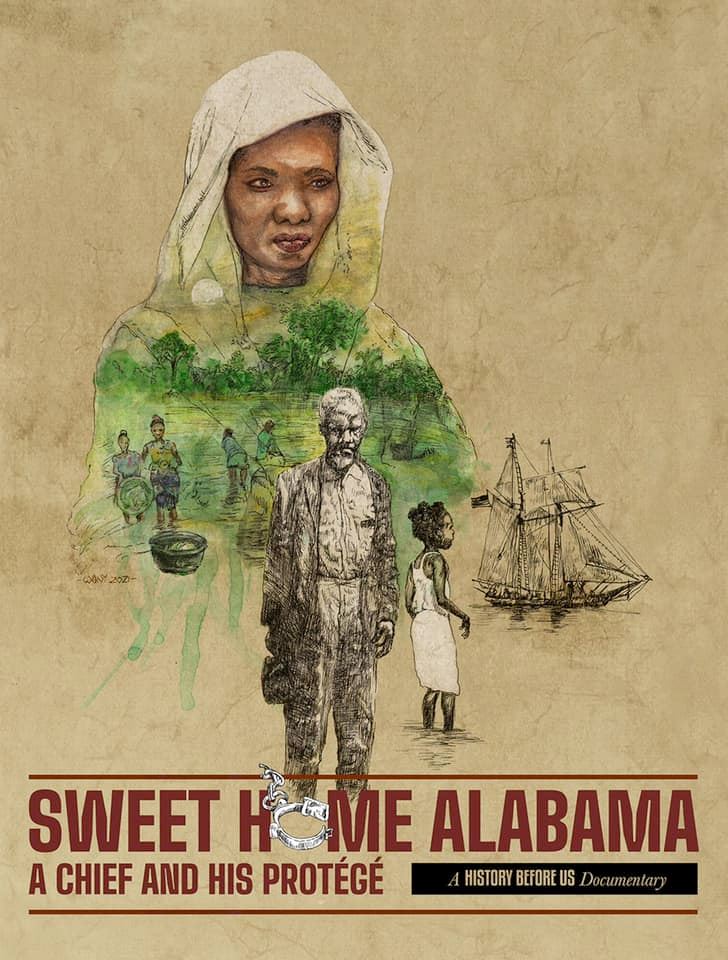
October of 2020, I passively asked her thoughts about being in a short documentary focusing on the on parallels of her life as a cancer survivor and Chief Olualay/Oluale aka Charles Lewis’s survival on the Clotilda. I figured over our two years of friendship, it wouldn’t be such a harsh sting if the answer was “no” due to the coverage she had been receiving since the 2018 reports of the Clotilda being discovered. Major production companies such as National Geographic, 60 Minutes, Washington Post, CSPAN, Now This News, PBS Captain’s Journal and countless others were blowing up her phone for interviews and she showed up graciously for each.
One of the glaring differences in my pitch versus theirs, was the focal point on her ancestor and not so much the story of the Clotida. Once the news broke that it was found, production companies started coming out of the woodworks to get the scoop from the descendants. While the discovery of the Clotilda is huge and much needed, human elements rooted in the continued resilience of the residents living in a community surrounded by chemical persecutors needed to be told. With little convincing she said yes. I was elated and virtually with her help, started scouting areas to film and people who can additional “umph” to the documentary. By the end of the year, we confirmed our film locations and additional subject.
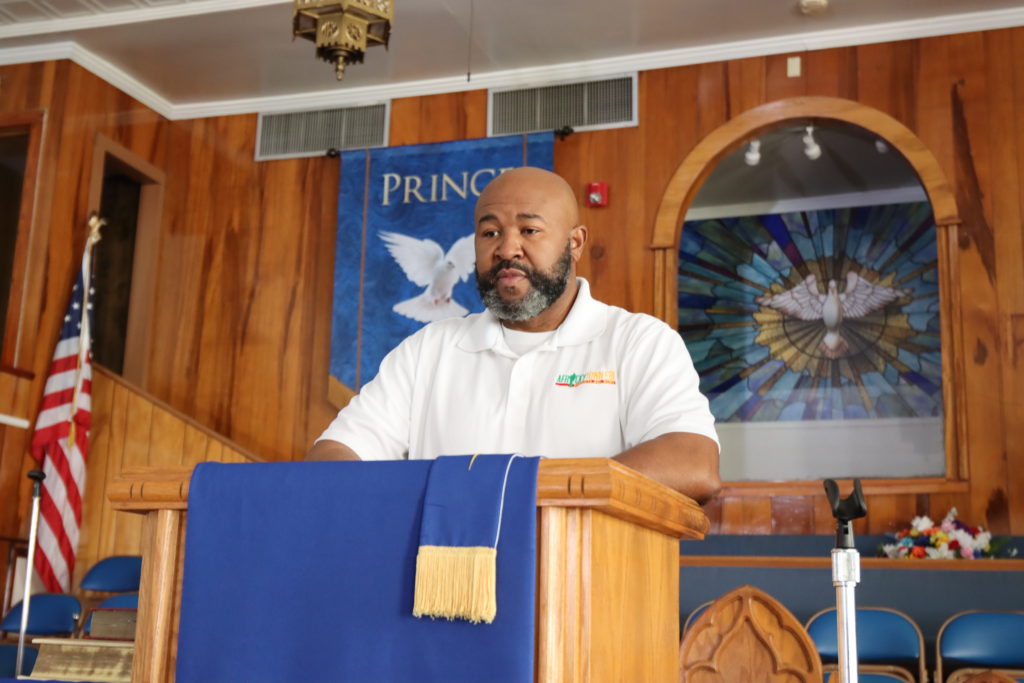
Pastor Derek Tucker of Union Missionary Baptist Church agreed to lend his years of research to the film. This was dope because Chief Olualay/Oluale aka Charles Lewis was a founding member of the church. In January of 2021, myself and film crew (A1Day1 productions) were in Africatown ready to capture the story of Chief Olualay/Oluale aka Charles Lewis’s protégé Joycelyn Davis. Joycelyn was at ease knowing this go round was not on national TV and she could be more laid back and treat the interview like being at a good ole southern BBQ, shooting the breeze with a family member. It was the first time we met face to face, but felt like we have known each other for a lifetime. She exemplified Chief Olualay/Oluale aka Charles Lewis’s self-determination by speaking very matter fact about her time recovering from chemotherapy, often times saying “I have to beat this” and not giving up on herself. These same sentiments had to mirror the beliefs of her ancestors who were illegally transported to a foreign land.
As we visited the historic Lewis Quarters, Union Missionary Baptist Church, Mobile Archives and other places relevant to HERSTORY, I could feel a purge of everything she has witnessed as a vicarious researcher of family history and victor to cancer.
Joycelyn may be 4’11 and soft spoken but we can’t forget she is a one of our beloved G.R.I.T.S (Girls Raised In The South) who has the DNA of a Chief, Chief Olualay/Oluale aka Charles Lewis to be exact. Needless to say, she was born to win.


No Comments